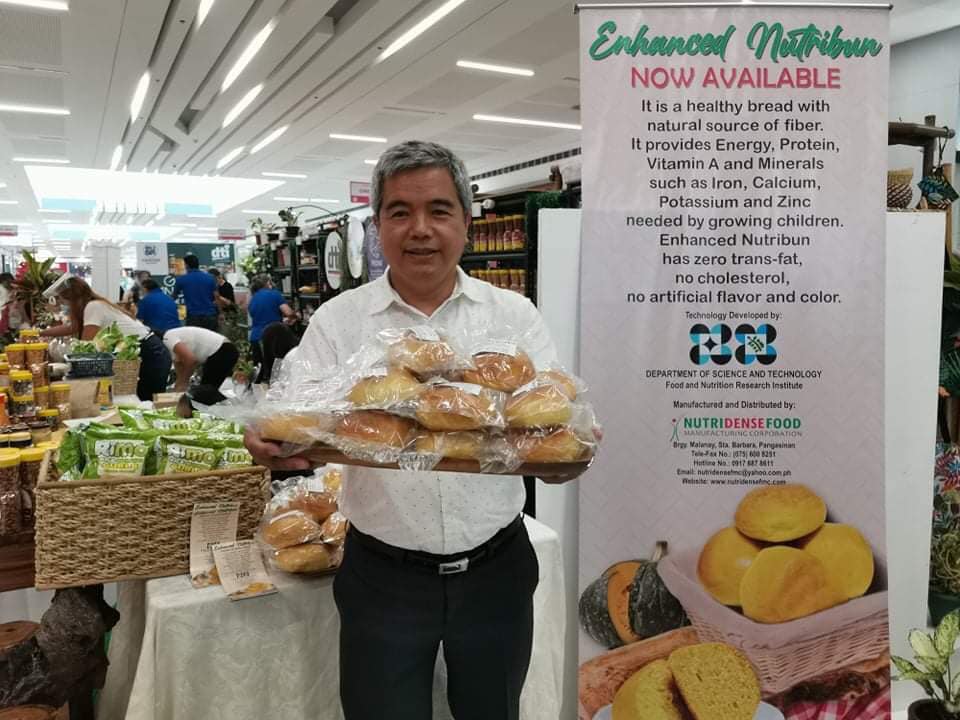News and Articles
DOST nutribun technology is free for Pinoy entreps
A Pre-NSTW PRESS RELEASE
The technology on enhanced nutribun can be given for free to qualified entrepreneurs who have technical capabilities to commercially produce the product. This refers to those with a GMP-compliant facility or working towards it, willing to invest in equipment and raw materials, and has a legal identity, or is a registered and taxpaying company, among others.
“The technology on the production of enhanced nutribun is a ‘public good technology’,” Rosemarie G. Garcia, Chief Science Research Specialist of the Food and Nutrition Research Institute of the Department of Science and Technology (DOST-FNRI), said.
Based on the 2018 Expanded National Nutrition Survey, the 6-9 years old have 63.1% vitamin A inadequacy, while those 10-12 years old have 76.1% vitamin inadequacy. The enhanced nutribun version, which was also initially developed for the undernourished children like the nutribun from the ‘70s, can actually also be consumed by healthy Pinoys. The enhanced nutribun is made from squash that is rich in vitamin A, a nutrient that’s lacking in the regular meal of Filipino children.
The enhanced nutribun is not only good for young children, but also for the other population groups, particularly, pregnant and lactating women, and senior citizens. Even the well and healthy population need products like the enhanced nutribun.
The Enhanced Nutribun has more micronutrients like iron and vitamin A. The texture is softer and weighs 160- 165 grams per piece, which makes it easier for children to hold and bite. Each serving has 504 calories, 17.8 grams protein, 6.08 milligrams iron and 244 micrograms vitamin A. A piece of enhanced nutribun already provides 60% of the requirements for vitamin A.
Racky Doktor, owner of Nutridense Food Manufacturing Corporation (NFMC) was among the first to sign up for the Enhanced-Nutribun technology of DOST-FNRI. Their company, which has a mission of helping reduce malnutrition through production and distribution of research-based food technologies, signed up immediately because the product is very nutritious, timely, and needed by both children and adults. Nutridense is one of the many successful enterprises that were assisted by the DOST under the Small Enterprise Technology Upgrading Program or SETUP.
There are already four licensees in Region II: the AJ’s Bread and Pastries; J.A. Fruits and Vegetable Processing; Quirino Livelihood for Everyone (Q-life); and J’s Bakeshop & Delicacies.
On the other hand, there are 14 in Region IV-A: the Gem See’s Cakeshop; Swisspharma Research Laboratories Inc.; San Jose Workers MPC; MRG Food Products/Malou’s Bakery; Magifrance Bakeshop and Café; Doughpro Manufacturing & Trading Corp.; LGU-Mauban, Quezon Province; Panaderia Pantoja, Inc.; Golden Wheat Bakery; El Richard Bakery; Anica’s Home Bread Store; Momilo Mio; Congw. Angelina “Helen” D.L. Tan, MD; and Amira’s Buco Tart Haus.
Since there is no more charge being asked for technology licensing, the primary cost will be the setting up of the facility and the purchase of equipment that will largely depend on the scale of production. DOST-FNRI’s pilot plant engineers will assist the entrepreneurs in terms of the plant lay out and the listing of equipment to be purchased.
Based on the assumptions and computation of DOST-FNRI’s engineers, the return of investment on the enhanced nutribun is more than 30%, and payback period is 2-2.5 years.
In the ‘70s, 30 million nutribuns were given to 200,000 children. While DOST-FNRI cannot give the exact number of children who can benefit from its enhanced nutribun, since the distribution will depend on DSWD, DepEd and the LGUs, Garcia said the institute’s rough and conservative estimate is that one million children would benefit from the product.
“We have more malnourished children now, than in the 70’s,” Garcia said.
DOST-FNRI is a research and development institute that developed the product and is ready to transfer it to capable partners who will then commercialize the product to its intended customers. For the enhanced nutribun, DepEd, DSWD and DTI expressed full support for the product. Incidentally, DepEd and DSWD have already the funds to give the products to the children for free through their school and supplementary feeding programs, respectively.
The nutrition institute invites Filipino entrepreneurs to partner with them in commercializing and producing the enhanced nutribun, and bring it not only to school children, but to all those who want nutrition in a bun!
Moreover, other DOST technologies developed for adoption by MSMEs will be featured in the virtual 2020 National Science and Technology Week (NSTW) slated from 23-29 November 2020. Among those that will be featured are the GALING-PCAARRD Program agricultural technologies, food production, and livelihood opportunities.
Furthermore, this year’s science fair will have activities for students who want to venture into the food business, the “Food Safety Career: What is it in Food Safety R&D, TekPinoy.biz, a virtual activity that will showcase technology on alternative livelihood for OFWs, and many others.
The public is invited to join the 2020 NSTW celebration and its many forums and webinars. For more information and updates regarding the 2020 NSTW, please visit the www.nstw.dost.gov.ph and its Facebook page or send your messages to nstw.secretariat@gmail.com and nstw2020.promotions@gmail.com. (S&T media service, Geraldine Bulaon-Ducusin)
FEATURED NEWS
17 NOV 2022
Sec. Solidum banners local technologies and innovations in the 2022 NSTW hybrid celebration21 OCT 2022
DOST showcases fishery, agro-forestry, ecotourism technologies during Caraga science fair
CONTACT US
Science and Technology Information Institute (STII)
Technology Application and Promotion Institute (TAPI)
(02) 837-2071 loc.2162
nstw.secretariat@gmail.com
(02) 837-2071 local 2148
nstwpromotions@gmail.com
